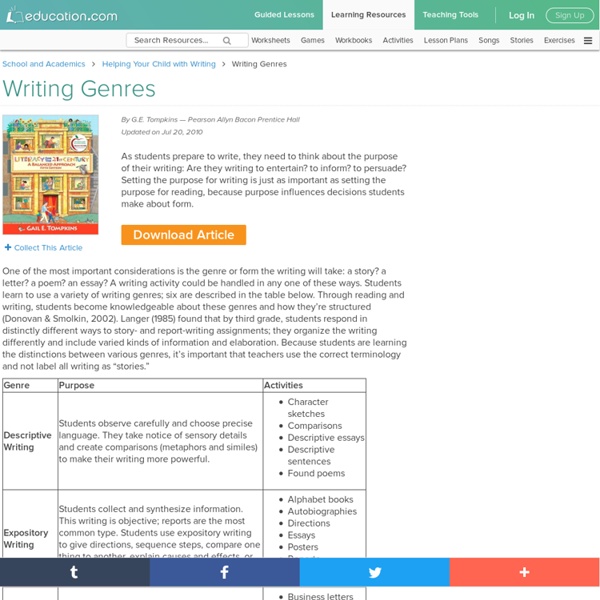



http://www.education.com/reference/article/writing-genres/
Related: English - Misc • writingThompson Writing Program: Genres of Writing Skip Navigation Duke University. Durham, NC 27708 | Contact How to Write a Short Story (with Sample Stories) Steps Part 1 Brainstorming Ideas 1Come up with a plot or scenario. Think about what the story is going to be about and what is going to happen in the story. Ereading Worksheets The study of genre is not an exact science. Some texts may belong in more than one genre. For example: Romeo and Juliet is a drama, a tragedy, and an Elizabethan play. The idea of genre is open to discussion and there is good reason to discuss genre. Understanding genre will help you know what to expect from a text based on its genre; it will also help you notice when an author is playing with your expectations. Type the email address of the account you want to sign in with. We're having trouble locating your account. Which type of account do you want to use? Sign in to {0} Which type of account do you want to sign in with?
Genre Map, Literary Map Publishers, booksellers, and readers describe books by their literary categories, or genres. It's how books are placed in stores and sold online. We created the Genre Map to help you find the right genre for your book. Roll over the map with your cursor to see the different genres. Some categories, such as women's fiction, stand alone. If you select mystery, fantasy, romance, science fiction, or thriller, you'll see the many subgenres that you can explore within these categories.
A Medieval Christmas Whilst the term “Christmas” first became part of the English language in the 11th century as an amalgamation of the Old English expression “Christes Maesse”, meaning “Festival of Christ”, the influences for this winter celebration pre-date this time significantly. Winter festivals have been a popular fixture of many cultures throughout the centuries. A celebration in expectation of better weather and longer days as spring approached, coupled with more time to actually celebrate and take stock of the year because there was less agricultural work to be completed in the winter months, has made this time of year a popular party season for centuries.
Writers Write is your one-stop resource for writers. Use these 45 ways to avoid using the word ‘very’ to improve your writing. Good writers avoid peppering their writing with qualifiers like ‘very’ and ‘really’. They are known as padding or filler words and generally add little to your writing. Culture - The language rules we know – but don’t know we know Over the weekend, I happened to go viral. Or rather a single paragraph from a book I wrote called The Elements of Eloquence went viral. The guilty paragraph went like this: “Adjectives in English absolutely have to be in this order: opinion-size-age-shape-colour-origin-material-purpose Noun. 5 Practical Ways To Help Students Improve Their Spelling Do you have students in your class who are doing okay with their reading, but they have so much trouble with spelling? And you’re not really sure what else you can do to help them improve their spelling? Don’t worry you’re not alone. I see lots of kids in the literacy clinic who are the same. They are doing okay with their reading, but it’s the spelling where they’re having the most difficulty. Last week we looked at teaching children to blend and why that is important.
This Crazy Language: English-Zone.Com Fun English Language Pages Posted with the gracious permission of the author.[Check out his books - they're FUN!] [Or visit his site] English is a Crazy Languageby Richard Lederer English is the most widely spoken language in the history of our planet, used in some way by at least one out of every seven human beings around the globe. Half of the world's books are written in English, and the majority of international telephone calls are made in English.
IELTS Writing- How To Write a Complex Sentence Introduction One of the biggest mistakes students make in IELTS writing is to try and show off and be overly ambitious with their grammar. This is because many students think that all of their sentences need to be ‘complex’ (they don’t!) and them not understanding what a ‘complex’ sentence is. Eddie Izzard gives inspiring speech on being transgender as he takes a break from marathon to get his nails done Eddie Izzard took a break from his epic Sports Relief marathon challenge to give an inspiring speech on being transgender. The comedian, who has now run 21 out of his 27 consecutive marathons, stopped off to get his nails done on Tuesday and took the opportunity to discuss his gender identity. In a video, the 54-year-old said: “Being a transgender guy, I do like my nails and they've been knocked about a bit so I'm getting my nails re-done.
IELTS Writing Tips These are IELTS writing tips for people doing the academic paper, but you will also find them useful for the general paper. Most of these tips are for IELTS writing task 2. Please also check out our article on tips for IELTS task 1.